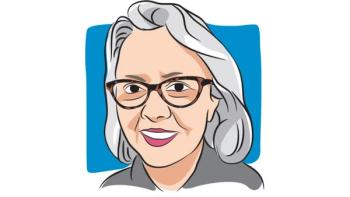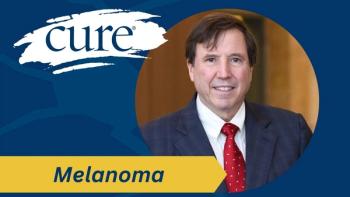
Thinking Locally, Acting Globally on Melanoma
When her beloved daughter, Charlie, died of melanoma at age 26, Valerie Guild wanted to honor her memory by helping others impacted by the disease.
“I thought I was going to find an organization and then volunteer a day or two a week … so much for that theory,” Guild said in an interview with CURE.
So much for that, indeed. Guild went on to be a co-founder of AIM at Melanoma, an international nonprofit foundation whose tireless efforts are helping to revolutionize melanoma care and advocacy within our borders and across the globe.
There for You
AIM at Melanoma offers several resources that provide immediate assistance and education for patients with melanoma and/or their caregivers.
On its
Patients and caregivers can also speak with AIM’s nurse-on-call, Barabara Smelko, an oncology nurse who will answer questions on the phone or through email free of charge.
AIM also hosts free educational symposia at renowned melanoma centers around the country. Speakers at these events often include top melanoma clinicians, dermatologists, geneticists and melanoma surgical oncologists.
Videos of the sessions are available after the events on AIM’s website and YouTube. Later this year, the symposia will be streamed live and people will be able to submit questions online during the sessions.
Guild said the focus of these and other AIM initiatives is to “educate patients about the disease, treatment options and clinical trials, and last, but not least, strongly suggest that because this is a rare cancer, patients should seek a second opinion from a melanoma specialist.”
It is this final point that Guild repeatedly returns to as a signature take-home message of melanoma advocacy.
Many patients with melanoma are first treated by a community oncologist. Since melanoma is a rare cancer, Guild said a community oncologist may see only one to two or even no cases of melanoma each year. These physicians may not be equipped with the full knowledge or resources to assist a patient with melanoma.
“It’s a fast-moving field with lots of advances — it really takes a melanoma specialist to understand all of the options that are available,” said Guild. “Patients need to seek a second opinion from a melanoma specialist in order to explore all of their options.”
Proactive on Policy
Beyond providing immediate resources, AIM also supports policy initiatives targeted at both preventing melanoma and advancing patient care.
A major issue that has emerged with the recent treatment advances in melanoma is oral parity. “In melanoma, all of our targeted therapies are oral drugs,” said Guild. However, these new oral drugs are more expensive than traditional intravenous treatments.
“We know for a fact that there are patients who are skipping their medication—taking it every other day—or not taking it at all because they simply cannot afford the copayment,” said Guild.
AIM advocates for enactment of oral parity initiatives that would ensure affordable patient access to these potentially life-saving treatments.
On the prevention front, AIM has led the effort to enact or initiate indoor tanning bans in several states for individuals under age 18. AIM hopes this will eventually extend nationwide, with the FDA banning indoor tanning for everyone aged 17 and under.
Acting Globally
AIM’s unique advocacy efforts stretch beyond the US borders to nations across the globe.
When AIM started, Guild quickly realized that melanoma patients in most other countries were in desperate need of a voice. “We assume that patient advocacy in the United States looks the way it does in the rest of the world. But that is far from true,” said Guild.
AIM has launched country-specific versions of its website that not only translate the language, but also adapt the information to reflect the standard of care in the specific countries. They have also worked with patient advocates in the individual countries by mentoring them and helping them create advocacy organizations. “It is our plan to help them grow to become as strong with advocacy in their countries as we are in this country,” said Guild.
AIM also launched the International Melanoma Working Group (IMWG), a global think tank through which the world’s leading melanoma investigators gather to discuss the latest innovations and cutting-edge research in the field.
A significant initiative that came out of the IMWG was the International Melanoma Tissue Bank Consortium (IMTBC).
A key hindrance to research advances in melanoma is that investigators do not have access to “fresh frozen” tissue from the primary tumor. Without this tissue, melanoma research has lagged behind some of the progress that has occurred with other cancers.
“There is certain research that can only be done on a primary tumor,” said Guild. “Every time you go to a melanoma meeting, there’s always somebody who says, ‘And if only I had primary tumors.’”
The IMTBC includes branches at four major research institutes in the United States, with a fifth international site that will be added. Guild said the initial goal is to collect 500 primary tumor samples among these institutions within approximately three years.
Leave No Patient Behind
Through all of its efforts on the domestic and international fronts, AIM strives to ensure all melanoma patients are accessing the tools and treatments available to them.
Guild says that, as with any disease, about 50 percent of patients are proactively taking full advantage of all available resources and medical care, including seeing a specialist.
“Our real challenge is that the other 50 percent who are not seeing specialists, may not be getting the best of treatments, and are not accessing online tools or looking into clinical trials.”
It is by reaching those individuals that AIM hopes to truly realize its mission of “Reshaping the Future Together.”




